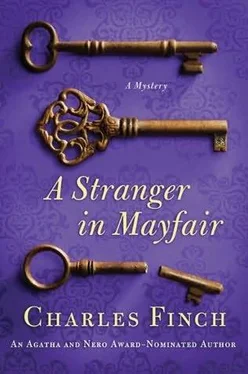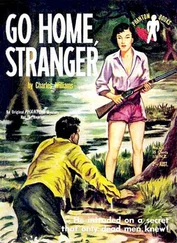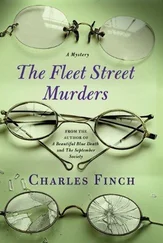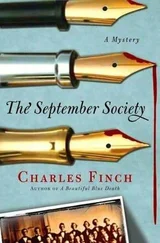Charles Finch - A Stranger in Mayfair
Здесь есть возможность читать онлайн «Charles Finch - A Stranger in Mayfair» весь текст электронной книги совершенно бесплатно (целиком полную версию без сокращений). В некоторых случаях можно слушать аудио, скачать через торрент в формате fb2 и присутствует краткое содержание. Жанр: Исторический детектив, на английском языке. Описание произведения, (предисловие) а так же отзывы посетителей доступны на портале библиотеки ЛибКат.
- Название:A Stranger in Mayfair
- Автор:
- Жанр:
- Год:неизвестен
- ISBN:нет данных
- Рейтинг книги:3 / 5. Голосов: 1
-
Избранное:Добавить в избранное
- Отзывы:
-
Ваша оценка:
- 60
- 1
- 2
- 3
- 4
- 5
A Stranger in Mayfair: краткое содержание, описание и аннотация
Предлагаем к чтению аннотацию, описание, краткое содержание или предисловие (зависит от того, что написал сам автор книги «A Stranger in Mayfair»). Если вы не нашли необходимую информацию о книге — напишите в комментариях, мы постараемся отыскать её.
A Stranger in Mayfair — читать онлайн бесплатно полную книгу (весь текст) целиком
Ниже представлен текст книги, разбитый по страницам. Система сохранения места последней прочитанной страницы, позволяет с удобством читать онлайн бесплатно книгу «A Stranger in Mayfair», без необходимости каждый раз заново искать на чём Вы остановились. Поставьте закладку, и сможете в любой момент перейти на страницу, на которой закончили чтение.
Интервал:
Закладка:
Behind his heavy curtains at Hampden Lane the detective slept for two or three untroubled hours. When he woke his first thought was of some obscure worry, and then he remembered the happy conclusion of the night and it vanished. All would be well now, he thought. He hoped.
Meanwhile the uncaring world marched on, taking extremely little notice of George McConnell’s birth, and Lenox had to dress hastily to make a meeting at eleven with several frontbenchers who were concerned about the strength of the pound.
“Kirk,” he called from his study just before he left, “have you settled with Chaffanbrass?”
The butler looked blank. “Sir?”
“The bookseller across the way.”
“I’m familiar with the gentleman, sir, but I don’t understand your question.”
A wave of irritation passed through Lenox before he realized how stupidly reliant on servants-on Graham-he was. “I could probably take care of it. Graham didn’t brief you on that?”
“Mr. Graham has been so busy in Whitehall, sir, that I see very little of him.”
“I generally pop over there and pick up books, and Chaffanbrass puts me down for them in his ledger. Graham goes over to pay.”
“With what funds, sir, might I inquire?”
“Do you not have any ready money?”
“Enough to pay the deliverymen, of course, sir.”
“I’d forgotten Graham went to my bank and withdrew cash for himself.”
Kirk looked shocked to his core. “Oh, sir?” was all he managed.
“We developed our own little ways, as you can tell.” Lenox smiled. “There’s money on my dresser-would you settle with Mr. Chaffanbrass today, and explain why it’s late? He counts on Graham coming in.”
“Of course, sir.”
“I hope I don’t ask too much of you. I’ve rather forgotten what’s usual.”
“Yes, sir.”
“You heard about the baby?”
“Yes, sir.”
“Well-excellent, excellent.” They stood awkwardly for a moment.
“Yes, sir. Will that be all?”
“Of course, go.”
Lenox went down to Whitehall and had his meeting, though after the long night he had trouble keeping his eyes open-and trouble, truth be told, caring much about the taxation concerns of the rich, blustery bankers who were speaking.
After it was over he intended to go straight to the McConnells’ house. Instead he found himself walking, almost involuntarily, toward Scotland Yard.
It was only a few steps away. Whitehall, the imposing avenue between Trafalgar Square and the Houses of Parliament, contained all the most important buildings of government (and was indeed now a word in Lenox’s mind that conjured not a street but an entire small world and its structure, rather like Wall Street in America), including Scotland Yard. The Yard stood originally in two rather modest houses along Whitehall Place, which were constantly stretched to include new property in all directions around them as the Metropolitan Police expanded in size. It was an untidy warren of rooms, with its own smell-dusty paper, old wood floors, wet coats that had never been aired out, dormant fireplaces.
Lenox knew the constables who manned the front desk and simply nodded at them on his way to the back offices. He passed what had once been Inspector William Exeter’s office, which now stood empty and bore on its door a plaque in the murdered man’s memory. Without saying hello he also passed the office of Inspector Jenkins, the sole man at the Yard with much sympathy for Lenox’s methods or interference.
Fowler’s office was empty, but just momentarily-a cup of tea steamed on the desk, and a lit cigarette smoldered in an ebony ashtray. As Lenox stood uncertainly in the doorway a voice spoke to him from down the hallway.
“What are you doing in my office?”
“Hallo, Fowler. I thought I might have a word with you.”
“Did you?”
He was distinctly unfriendly. This wouldn’t have surprised the vast majority of people who knew Grayson Fowler. He was an essentially disagreeable man, not particularly handsome, slightly snarling, always half-shaven, and poorly dressed. Nevertheless, with Lenox he had, in the past at any rate, been affable enough, because Fowler was sharp and valued the quality in others.
“It’s about Frederick Clarke.”
“I imagined it might be.”
“Can I come in?”
They were standing rather awkwardly in the doorway, with too little space between them. “I’d just as soon you didn’t,” said Fowler.
“I don’t want to tread on your turf. Ludo Starling is an old friend of mine, and asked me some time ago whether I might-”
“I believe since then he’s advised you to let Scotland Yard handle the case?”
“Well-halfheartedly. If we could just speak-”
“I’m afraid not.”
“But if-”
“No!” said Fowler loudly and turned into his office, shutting the door hard behind him.
Lenox felt himself turning red with embarrassment. He stood there for a moment, utterly nonplussed.
Eventually he turned and walked down the empty hall out into daylight again, hailed a hansom cab, and directed it to McConnell’s house.
Jane was fetched for him by a happily tipsy young servant girl.
“How is Toto?” he asked his wife.
“She’s doing wonderfully well, tired but resilient.”
“And happy?”
“Oh, marvelously happy.”
He smiled. “Do you know, it was wonderful to witness McConnell’s joy. I thought I had never seen a man so happy.” He shifted from one foot to the other. “I wonder, Jane, would you think of having a child one day?”
There was a pause. “I don’t know,” she said at last.
“It might be nice.”
“Aren’t we rather too old?”
He smiled softly. “Not you.”
She returned his affectionate look and grazed his hand with her fingertips. “It’s a conversation for another day, perhaps.”
Hastily-feeling slightly vulnerable, in fact slightly hurt-he said, “Oh, of course, of course. I’m only caught up in the happiness of the moment.”
“I understand.”
“Now-let’s take a look at this child, George. I assume she’s with a nurse somewhere hereabouts?”
“I’m afraid you can’t see her. Toto still has her. She won’t let the nurse take her away-‘just a few minutes longer,’ she keeps saying. You can’t imagine how she beams at the poor little child.”
“Too bad,” said Lenox. “I’ve wasted a trip.”
Chapter Sixteen
Strangely, the Palace of Westminster, that remarkable and ancient-looking panorama of soft yellow stone situated on the banks of the Thames (and better known as Parliament), was now just, in its fully finished form, about four years old.
This was so strange because it already seemed somehow eternal, and of course some parts of it were older. There was the Jewel Tower, a three-story building that stood over a moat, which Edward the Third had built to house his treasures in 1365. And to be fair, construction of the Houses had begun some thirty years before, so parts of the new buildings were at least that old. Still, for most of Lenox’s life it had been a work in progress. Only now did it stand on its own, unencumbered by builders or provisional outbuildings, so glorious it might have been there a thousand years.
The reason for the construction of the new Parliament was simple enough. A fire.
Until the middle of the 1820s, sheriffs collecting taxes for the crown had used an archaic method of recordkeeping, the tally stick. Beginning in medieval England, when of course vellum was far scarcer than paper now, the most efficient way to record the payment of taxes had been to make a series of different-sized notches in long sticks. For payment of a thousand pounds, the sheriff cut a notch as wide as his palm in the tally stick, while the payment of a single shilling would be marked with a single nick. The thumb was a hundred pounds, while the payment of one pound was marked, obscurely, with the width of a “swollen piece of barleycorn.”
Читать дальшеИнтервал:
Закладка:
Похожие книги на «A Stranger in Mayfair»
Представляем Вашему вниманию похожие книги на «A Stranger in Mayfair» списком для выбора. Мы отобрали схожую по названию и смыслу литературу в надежде предоставить читателям больше вариантов отыскать новые, интересные, ещё непрочитанные произведения.
Обсуждение, отзывы о книге «A Stranger in Mayfair» и просто собственные мнения читателей. Оставьте ваши комментарии, напишите, что Вы думаете о произведении, его смысле или главных героях. Укажите что конкретно понравилось, а что нет, и почему Вы так считаете.












